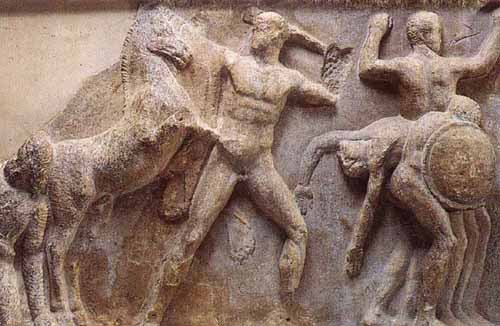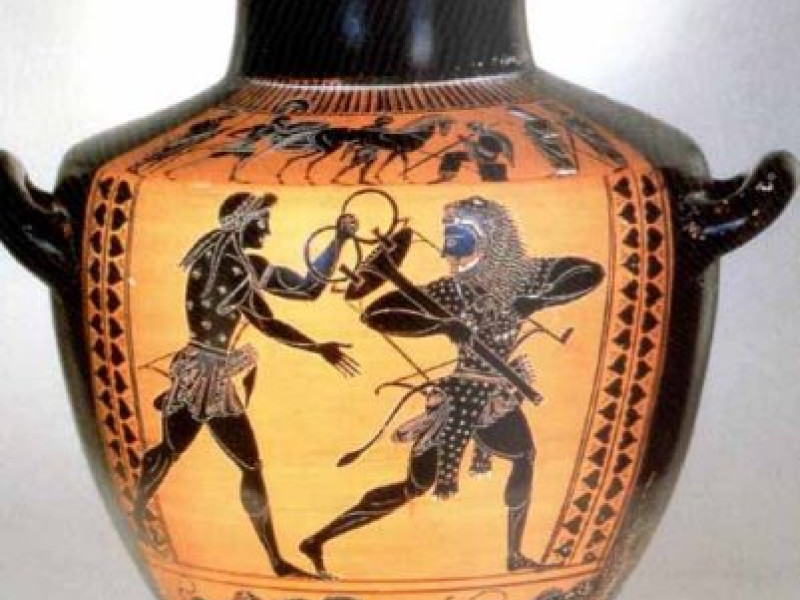Eighth Labour (Mares of Diomedes)
The eighth labour was to fetch the flesh-eating mares of Diomedes. Diomedes (Διομήδης) was the king of the Bistones, in Thrace, who fed human flesh to his horses. Heracles threw Diomedes to the mares, and they killed and ate the king.
There was a youth named Abderus who was a son of Hermes. He was a squire (and possibly lover) of Heracles. Heracles set Abderus to guard the mares. When Heracles returned, he found that the mares had devoured the youth. Heracles built a Thracian city called Abdera, named after Abderus.
Admetus and Alcestis
Admetus (Ἄδμητος) was the king of Pherae and husband of Alcestis (Ἄλκηστις), daughter of Pelias.
When the sun god Apollo had to serve Admetus for one year as his servant, Admetus treated the god well, because Admetus was known for being the most pious ruler in Greece. Apollo was being punished for killing a Cyclops who made thunderbolts for Zeus. Apollo had killed the Cyclops because Zeus had killed his son, Asclepius (see Asclepius).
Due to his kindness, Apollo helped Admetus in winning Alcestis' hand in marriage, and he successfully harnessed wild animals, a lion and a wild boar, to a chariot; it was a task set by Pelias.
Apollo also rewarded him by telling him that his death would come soon. Admetus could avoid his fate, if he could find someone willing to die in his place. None of his advisors or subjects were willing to die for him. Neither of his aged parents would agree either, because they valued their lives.
Alcestis, daughter of Pelias, realising how much her husband wanted to live, told him that she was willing to die in his place, because of her love for Admetus.
I'm not sure if Heracles was journeying north or coming back home with the mares, when Heracles decided to visit Admetus in Thessaly. Heracles was unaware that Alcestis would die that night. Admetus allowed Heracles to enjoy the feast, while Admetus was secretly mourning for his wife in the other room.
When Heracles realised he had been enjoying himself during funeral of his friend's wife; Heracles went to the tomb and wrestled with Thanatos ("Death"), while the god was trying to carry Alcestis' shade away from the tomb. Heracles overpowered Thanatos, and the god of death gave up Alcestis. Heracles happily restored Alcestis to her husband.
According to Apollodorus, this took place after Heracles was a suitor to Iole, daughter of Eurytus, and won the archery contest, but before Heracles killed Eurytus' son, Iphitus (see Death of Iphitus). However, Heracles fought Hades, not Thanatos, in this version.
Apollodorus also mentioned a different version in which Heracles was not involved with Admetus and Alcestis at all. The goddess Kore (Persephone), taking pity on Admetus and Alcestis, sent her back to her husband.
Related Information
Sources
Library was written by Apollodorus.
Alcestis was written by Euripides.
Library of History was written by Diodorus Siculus.
Fabulae was written by Hyginus.
Related Articles
By Jimmy Joe







